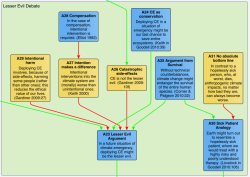
C-E-THICS
Arguing About Climate Engineering: Towards a Comprehensive Ethical Analysis of an Ongoing Debate
- Prof. Dr. Gregor Betz // Karlsruhe Institute of Technology (KIT) // PI
gregor.betz@kit.edu - Prof. Dr. Konrad Ott // Kiel University (CAU) // PI
ott@philsem.uni-kiel.de - Prof. Dr. Martin Visbeck // GEOMAR Helmholtz Centre for Ocean Research Kiel // PI
mvisbeck@geomar.de - Dr. Lieske Voget-Kleschin // CAU
- Christian Baatz // CAU
- Frederike Neuber // KIT
Project Description
While the Climate Engineering (CE) controversy has originally focused on scientific aspects and on governance topics, the number of genuinely philosophical and ethical contributions has rapidly grown in recent years as well, with a particularly sharp increase since 2010. Even beyond the philosophical literature, ethical issues are omnipresent in the debate and are frequently alluded to in contributions from natural and social science. The first international survey of public perception on CE came to the result that a vast majority of 69 % respondents raised ethical concerns. This shows that the importance of an ethical assessment of CE options is without doubt an integral part of the overall debate.
Despite the increasing number of ethical contributions, there exists however no comprehensive and detailed ethical assessment of the CE controversy which
- contains in-depth analyses of the arguments,
- connects to empirical, scientific findings,
- is case-sensitive and aware of the differences between various CE methods proposed,
- and systematically embeds the moral debate in the broader philosophical context.
The project "Arguing about CE" seeks to fill this gap.
|
|
||
O B J E C T I V E S
|
||
|
The overarching aim of this project is to provide a comprehensive, empirically informed ethical analysis of the CE controversy. Given the “state of the art” in CE-ethics, we identify the following research objectives: |
||
|
||
|
||
|
||
|
||
Methods
Structuring the overall debate. We identify the main issues and pinpoint crucial, possibly neglected normative or empirical questions whose significance might be underestimated and which need to be addressed scientificly and publicly. In addition, we identify relevant uncertainties and gaps of understanding.
Discriminating between different CE-methods. We assign the moral arguments, in light of their empirical assumptions, to the corresponding (possibly numerous) CE proposals. In doing so, we pay special attention to the three technologies of the SPP’s focus.

Clarifying the arguments. We further our understanding of the arguments by making explicit both their assumptions and presuppositions as well as the relations between the arguments. Clarifying the arguments also includes analyzing specific ethical concepts which are supposed in single arguments and the theoretical ethical background of such concepts.
Evaluating the premises. We provide or refer to empirical assessments of the descriptive premises the arguments rely on.
Assessing the dynamics of the debate. We study whether there is some kind of progress and/or convergence towards a partial consensus in the debate.
Gaining general philosophical insights. We reflect argumentation-theoretic and discourse-ethical aspects of the controversy (e.g., underlying rules of discourse, shifts in burdens of proof) so as to obtain general ethical and argumentation-theoretic insights that are of relevance to other fields and controversies as well.
Understanding the broader societal and political debate. We determine the relationship between ethical discourse and political debates on CE and try to assess the relative importance of genuinely moral reasoning in public discourse. This includes, in particular, the study of framing effects.
